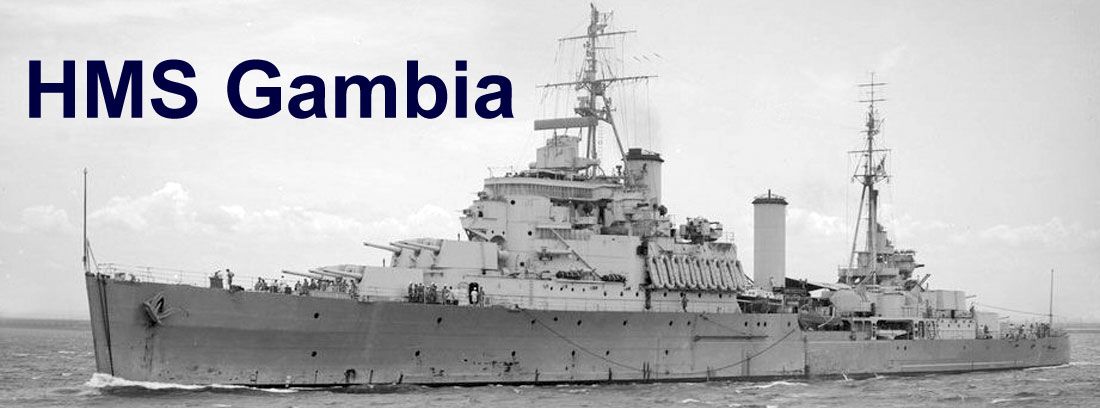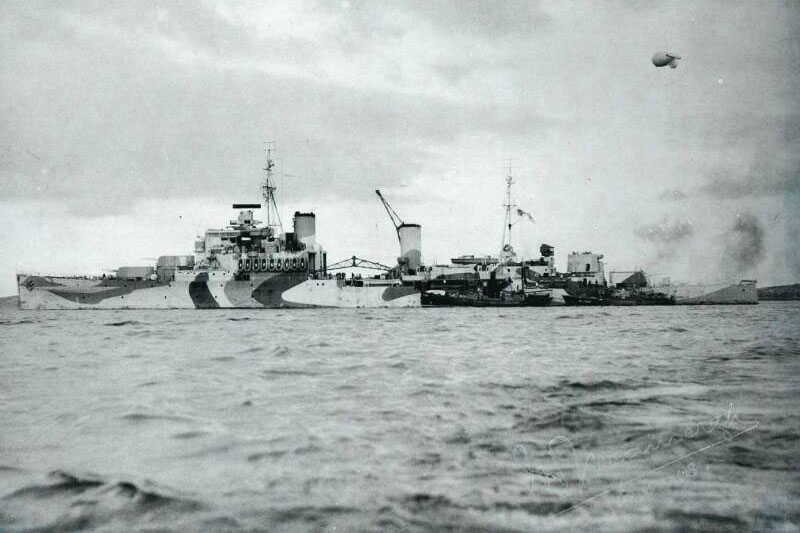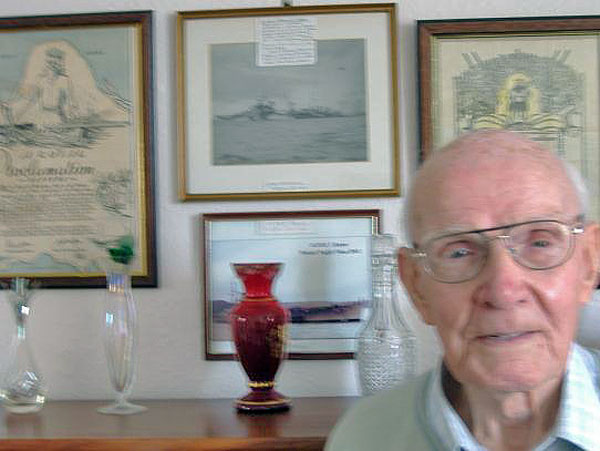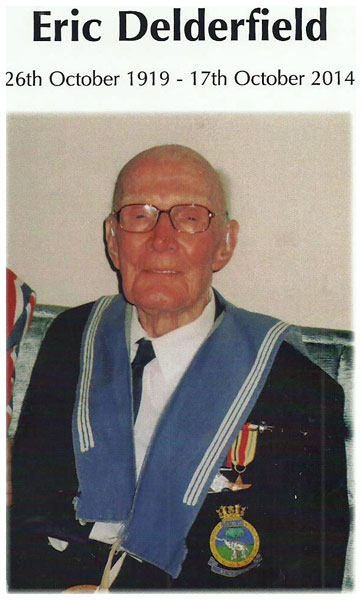
Eric Delderfield
Eric Delderfield (October 26, 1919 – October 17, 2014)
HMS Gambia, First Commission, 1941 – 1943
Son of Fred Delderfield and Alice Harriet Delderfield
Father of Roger E Delderfield and Richard C Delderfield
Brother of Fred, Wilfred Thomas, Frank, Arthur, Ted, Winifred, Elsie, Horace, and Alice.

HMS Gambia in WW2 guise, note the Barrage Balloon in the top right of the picture. It is also signed by Captain Maurice James Mansergh, RN who was captain of HMS Gambia from November 25, 1941 to June 23, 1943. The image was kindly sent to the HMS Gambia Association by Eric Delderfield who was on the first commission.

Eric Delderfield with some of his memorabilia on his lounge wall. Note the Gambia and Anson behind the small urn.
94 year old Eric Delderfield remembers WW2 at a 2013 HMS Gambia Association dinner
Here's a transcript of the video:
And to the girls who obviously weren't in the war years, thankfully. Though I would like to say a just few words about my family not me so much but obviously I'm going to be a part of it. I am the ninth of ten children. My older brothers Fred, Wilfred, Frank, Arthur, Ted, Alice, Elsie, as you can see, it goes on a bit, and that's about six of us, we were all in the navy, and at one time, we were all at sea.
I met my brothers, in various parts of the world, we won't go into the details, except I was walking up one side of the road, and my brother Frank or Ted, not Ted so much as Ted was killed in HMS Formidable in Crete. He was the only one on board at that particular time that was hit. He was in his turret, doing whatever they did in the turrets and unfortunately it killed him outright. So we lost brother Ted.
Brother Wilson was also a survivor, I can't recall the name of the ship, in Egypt. Brother Frank was also on the Southampton, badly wounded, so I thought over all these years whatever did my mum think, what was going through, back home and quite honestly it never occurred to me. As indeed most of us who was in our situation where we were at the time.
I was on the Gambia for two years, from the start to the finish of the first commission. It was the first ship I had encountered with. I was completely lost as indeed most of them were because at the time the crew was made up of 95% amateurs. We were amateurs. Even the officers were amateurs. I remember on many occasions, especially at the time we were waiting for the Germans to invade us, it was a real fear. No doubt about it, we knew, well we thought we knew, we were told, one or two of us, me included at some point said to whoever it was, it was an officer, "what do we do?" and all he said was "they'll be coming down in thousands, shoot 'em. Just kill them and get on with the next one. Shoot 'em."
Bear in mind we just got out of Civvy Street, and complete idiots. We didn't know what was happening, but we were told, not so much told because we all knew they didn't know as much as we were. So just what do you do, and indeed the answer was shoot 'em.
Anyway, that's all part of the situation we found ourselves in. There was never, ever a situation that masses of servicemen as indeed we were, we were supposed to be servicemen, I can't think of how many times I had to remind myself. We knew nothing, but the threat was real. No doubt about the Germans were five times better fighters than we were, as they were heavier.
As a point of interest, anybody at Chatham Barracks at that time?
Not at that time, long after.
Go to a part of the barracks, and I'm trying to recall the name now, but whatever it was, it was "how to fire the gun." I had a rifle, I had a bayonet, I looked the part, bloody useless. We all were, we didn't know what the hell we were supposed to be doing other than shoot 'em. I thought to myself, "well, if I'm going to go, I'm going to take someone with me."
I can see it after all these years, as if it was happening yesterday. But, I do find it difficult at times just to accept the fact that that's what we were walking into. We knew nothing except that we were told time and time again "Shoot the Germans." I think it was about February 2nd, 1942, that we joined the Gambia. I'm pretty sure of the date.
That was something else, bear in mind I was in the army basically two years. There were no ships available for us to run. What are we going to do with them? I was based somewhere in Kent, [Ashford?] that's where the Germans would have come in had they started to invade. He (King George VI) was inspecting the troops, we didn't worry too much about him, he was bloody useless anyway. "What's he doing here?" He was looking up and down the lines and there must have been a few hundred of us. He didn't exactly laugh at the blokes, obviously he wouldn't have been in a position to do so, but he was quite surprised to see sailors, dressed as sailors of course, but acting as soldiers, which we were. Anyway, that's by the by. We got a congratulations for how smart we looked and all this business. We were only 20 years old, so eventually, I was certainly there for the best part of two years. We were ready to pull the trigger, but nothing happened. We didn't know of course, as it was the situation we were in before.
Eventually I learned that my brother Ted has been killed earlier on, on Formidable. I volunteered and that's how I picked up the Gambia and I was on her for two years. I travelled the world a few times as you might well imagine, as indeed most of you have done the same. So, nothing special about that, it's just the fact that I did a lot of sea-time. I must tell you before I sit down again, HMS Gambia, we played Gambia at football and we beat them, but the point was, the natives of Gambia said that they'd bought our ship and that the kids, thousands of them, were entitled to our ship as they had paid for it. We beat their national team, 3-0.
Most of us thought a little way ahead how many German U-boats were waiting for us to come out. They knew damn well where we were. Everyone in the world knew where the Gambia was. Most of us, the majority of us, were very wary about the fact that the ship would come out on the way home, and fully expected to meet trouble. Knowing full-well of course that these thousands of kids were telling the whole world they were expecting HMS Gambia.
We've all got our own stories to tell. Some is unbelievable, most of it is the truth, but there's always a bit of embellishment along the line somewhere. If I might add, for any of us, in a position to do so, to jot down a few things what's happened. I've got some bits and pieces from 1942.
Thanks for listening to me rattling on and I hope I'm in a position to see you all next year.
Bill Hartland wrote that "Sadly, not long after this speech from Eric, he passed away, so a sad loss to the HMS Gambia Association. I was privileged to precede the cortege along with the Association Standard Bearer to the Entrance of the Church, where Eric was committed for cremation. Eric was an LTO on HMS Gambia, and the LTO was a Torpedo Operator, so not anything to do with Telegraphy which some folks thought he was a Leading Telegraphist Operator. He was actually a Killick in charge of a weapon which should have been managed by a commissioned officer, not the equivalent rank of a corporal in the Army. Rest in Peace Eric, sadly missed."

Eric's brother, Edward (Ted) was a Royal Marine, PO/X 4557, who was killed during a bombing raid on HMS Formidable, on May 26, 1941 near Crete. There is a damage report of the attack on the Armoured Carriers website.